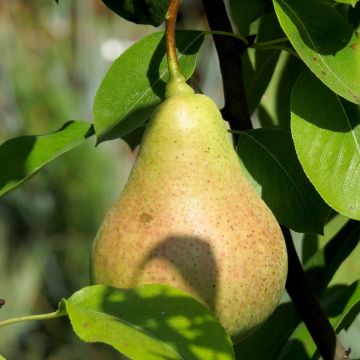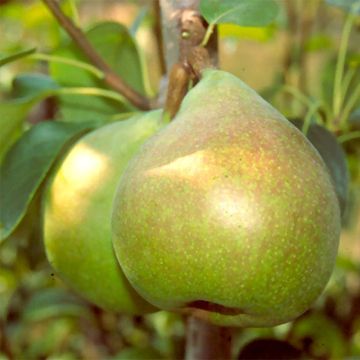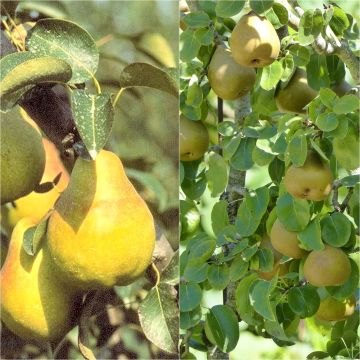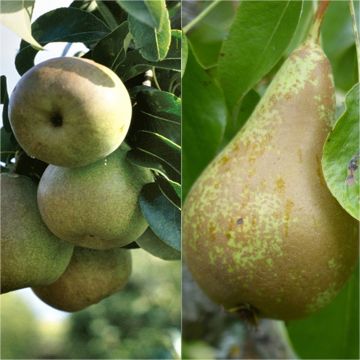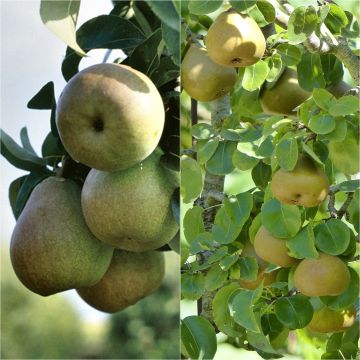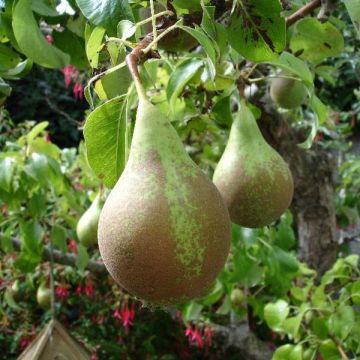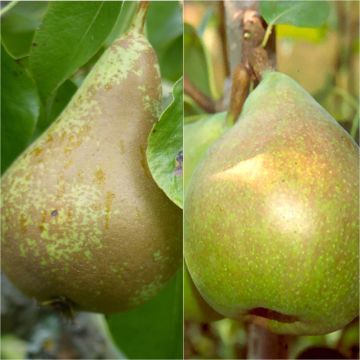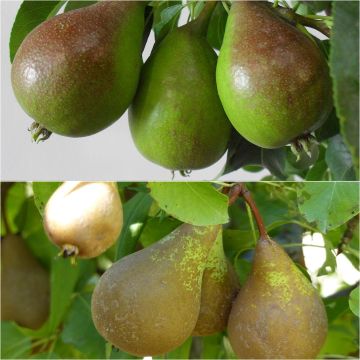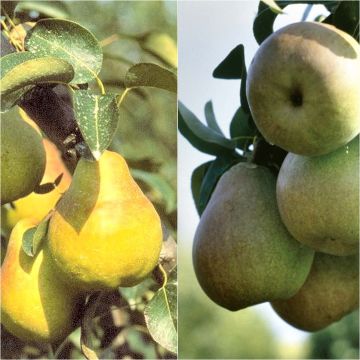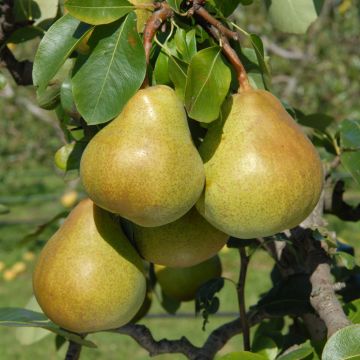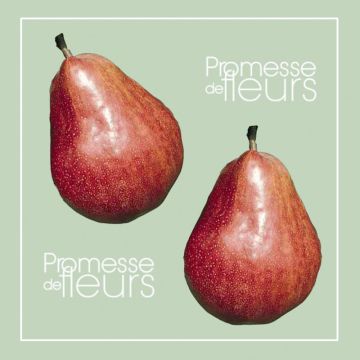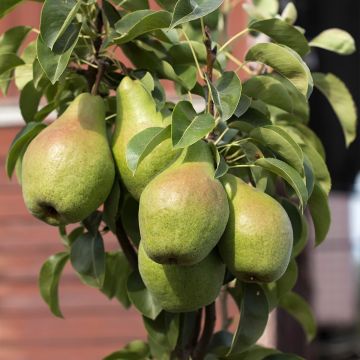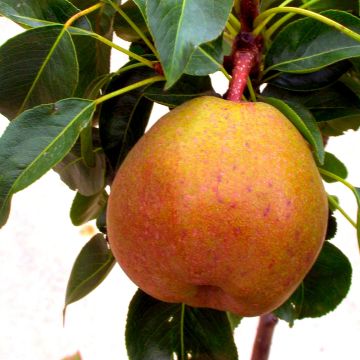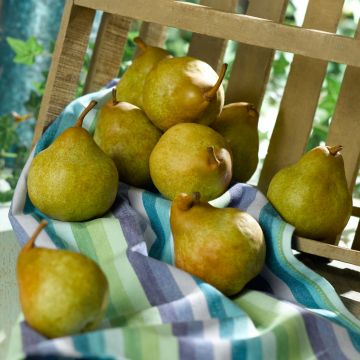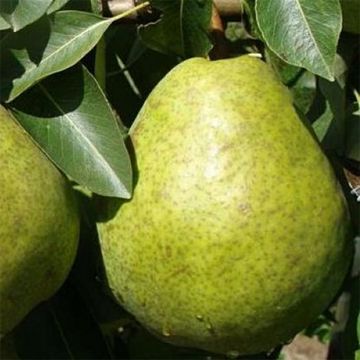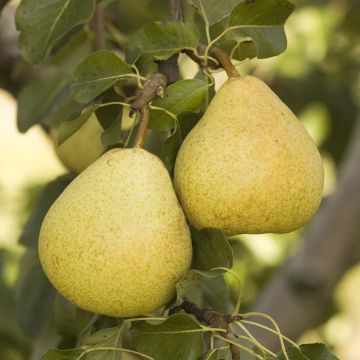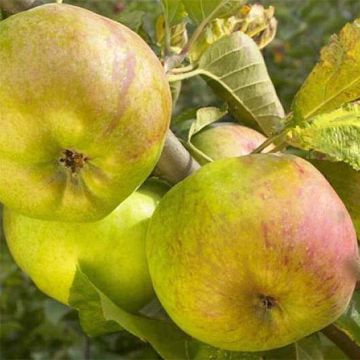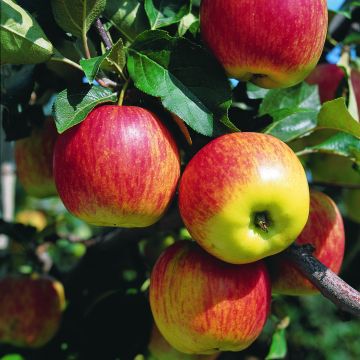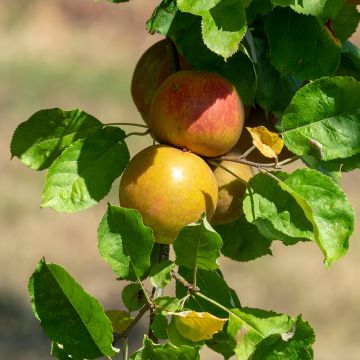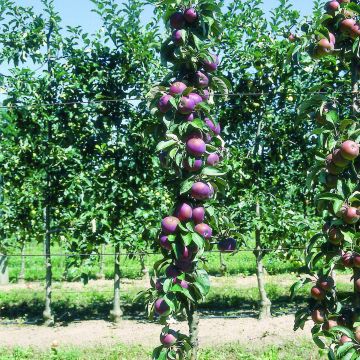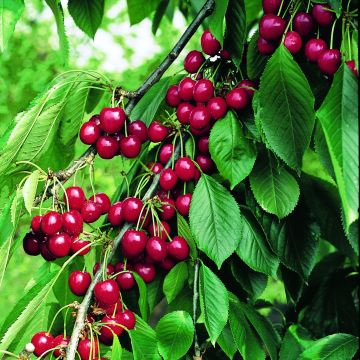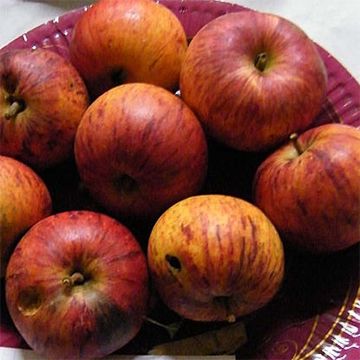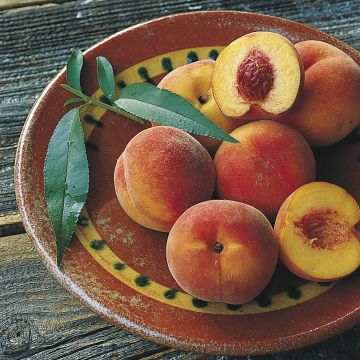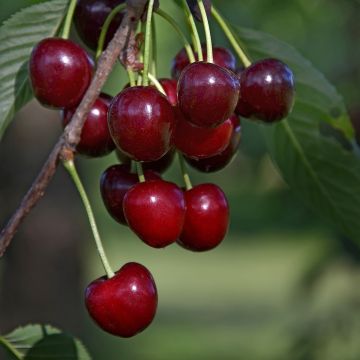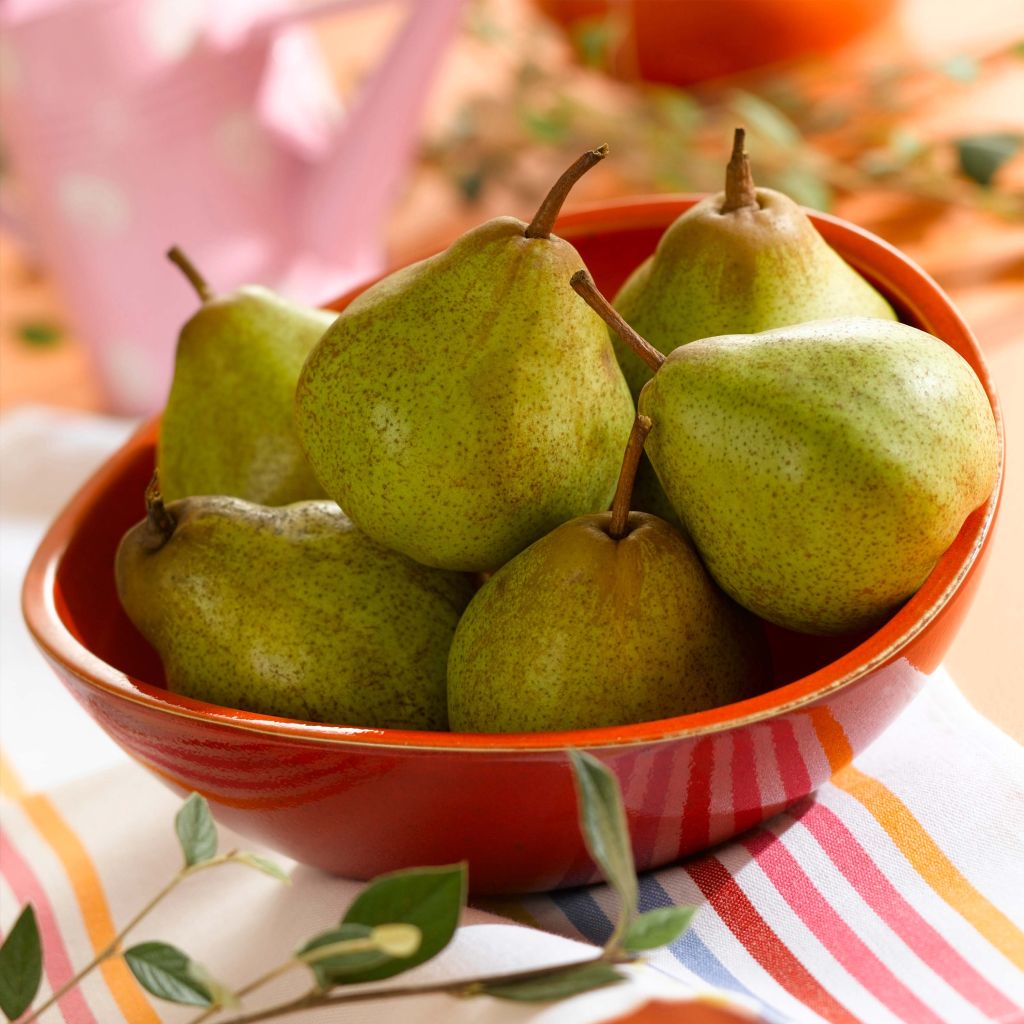

Poirier Peradel - Georges Delbard
Pyrus communis Peradel - Pear Tree
Pyrus communis Peradel® delbuena
Common pear, European pear
Special offer!
Receive a €20 voucher for any order over €90 (excluding delivery costs, credit notes, and plastic-free options)!
1- Add your favorite plants to your cart.
2- Once you have reached €90, confirm your order (you can even choose the delivery date!).
3- As soon as your order is shipped, you will receive an email containing your voucher code, valid for 3 months (90 days).
Your voucher is unique and can only be used once, for any order with a minimum value of €20, excluding delivery costs.
Can be combined with other current offers, non-divisible and non-refundable.
Why not try an alternative variety in stock?
View all →This plant carries a 6 months recovery warranty
More information
We guarantee the quality of our plants for a full growing cycle, and will replace at our expense any plant that fails to recover under normal climatic and planting conditions.
Description
The 'Peradel'® (delbuena) Pear Tree is productive, offering beautiful and appetizing fruits, plump and covered with a finely speckled bronze skin. The flesh is fragrant, sweet and tangy at the same time, juicy and melting. These pears are harvested from the end of October and can be stored in a cool place until January without losing their taste qualities. This variety is not self-fertile.
The pear tree is a tree native to central Asia, cultivated in China for 6,000 years. It was introduced to Europe around the 6th century. The leaves have an oval lamina, with finely toothed edges and a petiole as long as the lamina. The late white flowering occurs in April, protecting it from frost. Its flowers consist of 5 white petals. The flowers of the 'Peradel'® (delbuena) pear tree are not self-fertile. Its main pollinators are the 'Conference', 'Williams', 'Doyenné du Comice', 'Delbard Gourmande'® and 'Delbardélice' varieties. Planting one of these trees nearby will ensure regular and generous production.
If not frost-sensitive, the 'Peradel'® Pear Tree will still appreciate sheltered and sunny locations, avoiding windy areas. Easy to grow, it likes fresh and deep soils, but is not suitable for excessively draining or calcareous soils. In winter, provide it with a shovelful of wood ash, rich in potash, which will improve flowering and fruit quality.
This variety produces pears with a bronzed yellow skin and a melting flesh, sweet and tangy in perfect balance, fragrant, some compare its flavour to that of medlars. Pears can be eaten fresh, in syrup, in pastries, in jams and compotes, and can be used to prepare alcoholic beverages...
This fruit tree is delivered in a "ready-to-plant" root ball. During planting, the root ball should be planted as it is. The biodegradable tontine that surrounds the root ball and preserves the rootlets will decompose naturally during the plant's growth. By doing so, you ensure better recovery.
Report an error about the product description
Pyrus communis Peradel - Pear Tree in pictures
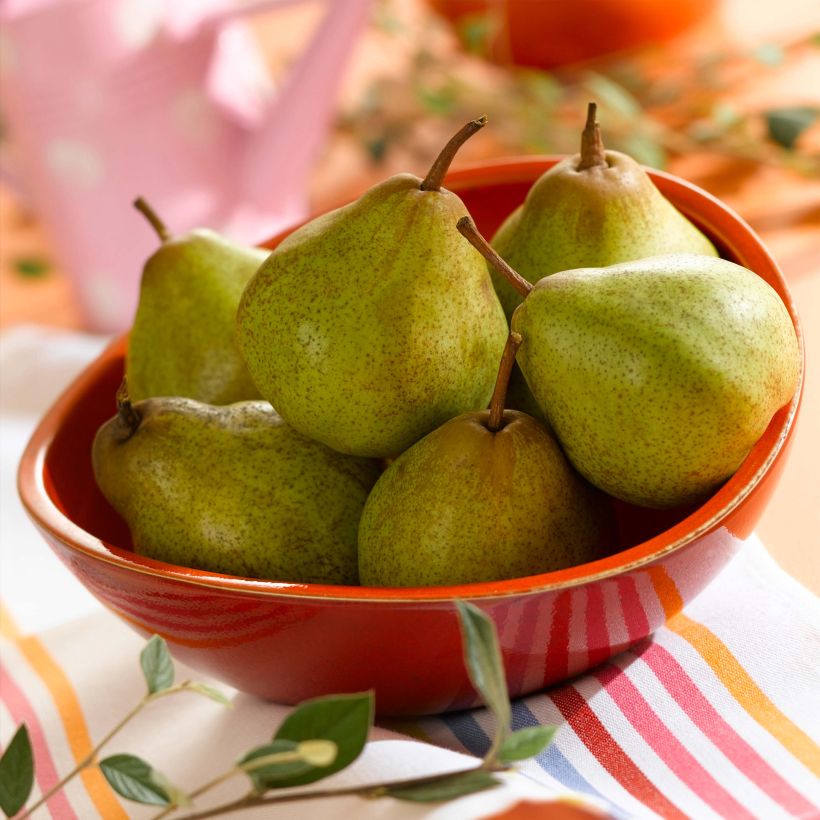

Plant habit
Fruit
Flowering
Foliage
Botanical data
Pyrus
communis
Peradel® delbuena
Rosaceae
Common pear, European pear
Cultivar or hybrid
Cognassier de Provence (Ready-to-plant root ball - Goblet)
Other Pear trees
View all →Planting and care
Plant the 'Peradel'® pear tree in a sunny location, in acidic or neutral soil, moist but not overly wet. Ensure proper drainage of the planting hole with a thin layer of gravel. Dig a hole two to three weeks before planting, twice as wide and deep as the pot. On the day of planting, place the tree with its pot in a basin of water, in order to moisten the entire root ball through capillary action. Add compost to the bottom of the hole. Place the tree in the hole, fill with a mixture of soil and compost. Do not bury the graft union. Firmly tamp down the soil around the base. The root ball should be completely covered. Water thoroughly.
You can add a small handful of wood ash, rich in potash, during winter, to improve fruiting.
Planting period
Intended location
Care
This item has not been reviewed yet - be the first to leave a review about it.
Similar products
Haven't found what you were looking for?
Hardiness is the lowest winter temperature a plant can endure without suffering serious damage or even dying. However, hardiness is affected by location (a sheltered area, such as a patio), protection (winter cover) and soil type (hardiness is improved by well-drained soil).

Photo Sharing Terms & Conditions
In order to encourage gardeners to interact and share their experiences, Promesse de fleurs offers various media enabling content to be uploaded onto its Site - in particular via the ‘Photo sharing’ module.
The User agrees to refrain from:
- Posting any content that is illegal, prejudicial, insulting, racist, inciteful to hatred, revisionist, contrary to public decency, that infringes on privacy or on the privacy rights of third parties, in particular the publicity rights of persons and goods, intellectual property rights, or the right to privacy.
- Submitting content on behalf of a third party;
- Impersonate the identity of a third party and/or publish any personal information about a third party;
In general, the User undertakes to refrain from any unethical behaviour.
All Content (in particular text, comments, files, images, photos, videos, creative works, etc.), which may be subject to property or intellectual property rights, image or other private rights, shall remain the property of the User, subject to the limited rights granted by the terms of the licence granted by Promesse de fleurs as stated below. Users are at liberty to publish or not to publish such Content on the Site, notably via the ‘Photo Sharing’ facility, and accept that this Content shall be made public and freely accessible, notably on the Internet.
Users further acknowledge, undertake to have ,and guarantee that they hold all necessary rights and permissions to publish such material on the Site, in particular with regard to the legislation in force pertaining to any privacy, property, intellectual property, image, or contractual rights, or rights of any other nature. By publishing such Content on the Site, Users acknowledge accepting full liability as publishers of the Content within the meaning of the law, and grant Promesse de fleurs, free of charge, an inclusive, worldwide licence for the said Content for the entire duration of its publication, including all reproduction, representation, up/downloading, displaying, performing, transmission, and storage rights.
Users also grant permission for their name to be linked to the Content and accept that this link may not always be made available.
By engaging in posting material, Users consent to their Content becoming automatically accessible on the Internet, in particular on other sites and/or blogs and/or web pages of the Promesse de fleurs site, including in particular social pages and the Promesse de fleurs catalogue.
Users may secure the removal of entrusted content free of charge by issuing a simple request via our contact form.
The flowering period indicated on our website applies to countries and regions located in USDA zone 8 (France, the United Kingdom, Ireland, the Netherlands, etc.)
It will vary according to where you live:
- In zones 9 to 10 (Italy, Spain, Greece, etc.), flowering will occur about 2 to 4 weeks earlier.
- In zones 6 to 7 (Germany, Poland, Slovenia, and lower mountainous regions), flowering will be delayed by 2 to 3 weeks.
- In zone 5 (Central Europe, Scandinavia), blooming will be delayed by 3 to 5 weeks.
In temperate climates, pruning of spring-flowering shrubs (forsythia, spireas, etc.) should be done just after flowering.
Pruning of summer-flowering shrubs (Indian Lilac, Perovskia, etc.) can be done in winter or spring.
In cold regions as well as with frost-sensitive plants, avoid pruning too early when severe frosts may still occur.
The planting period indicated on our website applies to countries and regions located in USDA zone 8 (France, United Kingdom, Ireland, Netherlands).
It will vary according to where you live:
- In Mediterranean zones (Marseille, Madrid, Milan, etc.), autumn and winter are the best planting periods.
- In continental zones (Strasbourg, Munich, Vienna, etc.), delay planting by 2 to 3 weeks in spring and bring it forward by 2 to 4 weeks in autumn.
- In mountainous regions (the Alps, Pyrenees, Carpathians, etc.), it is best to plant in late spring (May-June) or late summer (August-September).
The harvesting period indicated on our website applies to countries and regions in USDA zone 8 (France, England, Ireland, the Netherlands).
In colder areas (Scandinavia, Poland, Austria...) fruit and vegetable harvests are likely to be delayed by 3-4 weeks.
In warmer areas (Italy, Spain, Greece, etc.), harvesting will probably take place earlier, depending on weather conditions.
The sowing periods indicated on our website apply to countries and regions within USDA Zone 8 (France, UK, Ireland, Netherlands).
In colder areas (Scandinavia, Poland, Austria...), delay any outdoor sowing by 3-4 weeks, or sow under glass.
In warmer climes (Italy, Spain, Greece, etc.), bring outdoor sowing forward by a few weeks.






























